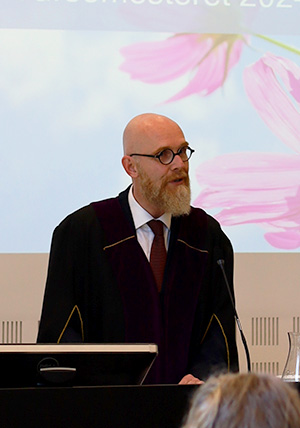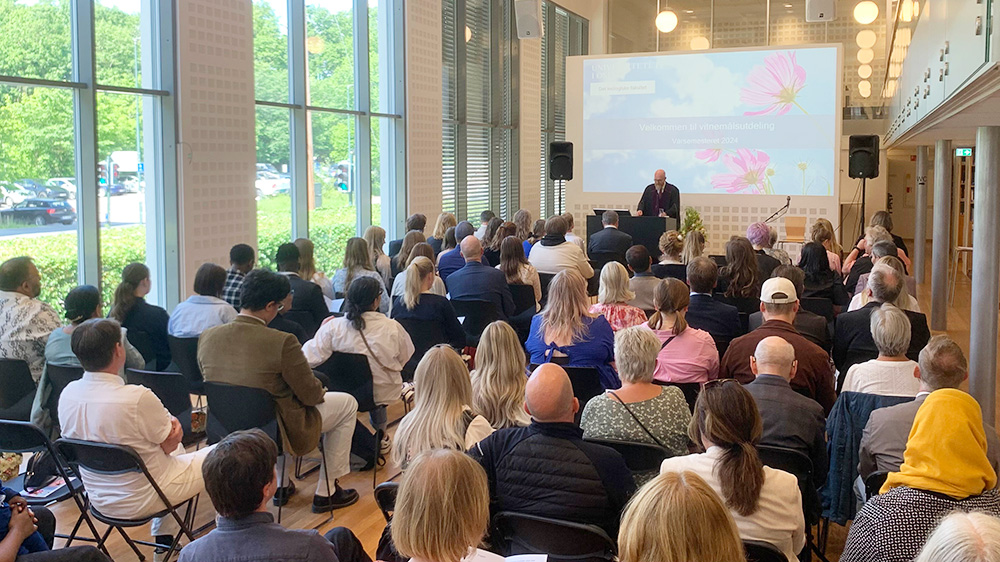Dekanens tale
Kära kandidater, familie og venner av kandidatene, studenter og kolleger// Dear candidates, family and friends of the candidates, students and colleagues.
‘What is truth?’ Probably, the most famous person asking this question was the Roman prefect Pontius Pilate, who directed it at Jesus just before he sent him off to be executed on unclear charges around 2000 years ago. But Pilate was certainly not the first person pondering the meaning of truth. All religions throughout history have grappled with the nature of reality, as we experience it, and so has philosophers, whether religious or non-religious.
In fact, that which we call ‘truth’ is the fundamental issue around which the very idea of a university is built, and which, one way or another, lies at the heart of all academic pursuit — from the study of theology and religion to research in medicine and the natural sciences and beyond. The pursuit of truth unites us all and is, in the end, the reason why we are gathered here today: to celebrate the advances in the production of knowledge and new insights made by our new candidates — knowledge and skills, which these diplomas that we are soon going to hand out are a recognition of.
Truth is patient, as it awaits us. It does not divide but brings us together.
As researchers and teachers and administrative facilitators, we are privileged to have been part of your academic journey, from the moment you entered the doors to Domus Theologica until you leave to make your mark on the world. For research and learning is never a one way street — it is a dynamic space of a myriad relationships, which together moves our minds in new directions. We have asked questions together, and we have pondered together possible answers even to questions we didn’t know we had.

For the nature of ‘truth,’ I believe, is precisely that: a dynamic space of a myriad relationships, which together moves our minds in new directions.
Truth is not static – it is not a ‘thing’ we can hold in our hands after having reached it. It is a process, rather, that happens as we seek it. Truth is patient, as it awaits us. It does not divide but brings us together. Truth is not envious or boastful or arrogant or rude; it is not irritable or resentful but rejoices in those who seek, those who long for insight and discernment. And with truth comes wisdom, its twin, the silent and often unsung goal of the academic pursuit.
What is truth? What if the question is not so much about what it is, but what it does?
What, then, if this is the nature of truth, does the idea of an ‘alternative truth’ communicate? This notion of distinct otherness claiming to be what it by definition cannot; a wannabe truth that has invaded social media as well as the physical world. Perhaps the best answer to this question is not to ask what it is, but what it does, as division, polarization, chaos, and violence follow in its footsteps. For that is the goal of ‘alternative truths’ — to divide and conquer; to rule through confusion, destabilization, and polarization. Many may remember how internet trolls working from within a non-democratic country targeted democracies during the pandemic, with strong messages both for and against vaccines. The point was not the pursuit of truth; the goal was division and chaos. By its fruit you will know the tree.
Your academic work has been aimed at giving you tools, critical tools, with which to approach the world; to discern what’s real and what isn’t, and to act on the insights that your analyses give birth to. Not since the Second World War has this been more important. Wherever you stand on the political spectrum, our democracy depends on your discernment and critical skills.
We can provide that voice which those who are in the midst of hell itself can’t find.
The world is again in despair. Wars rage in Europe and across the globe, many of them ignored by our news media. The suffering in Gaza is unimaginable. The anguish of those in Israel whose loved ones are held hostage is impossible to conceptualize. For those of us who have been to Gaza and the Westbank, to Palestine, and who have listened to the Palestinian people and seen their pain, these are dark times. For those of us who have lived in the middle of it all and have friends on both sides who want peace but whose lives are held captive by fanatics among their own peoples, extremists who are willing to sacrifice whoever it may be to reach their goals, for us the last year has been an endless, uninterrupted nightmare, in which hope has gradually evaporated.
It is easy to feel helpless. But, and here’s the key message: we are not. As academics, we can use our critical skills to help build a knowledge-based foundation for the debates that are raging, and which affect people’s lives directly and indirectly. We can provide that voice which those who are in the midst of hell itself can’t find. As the Palestinian bishop Munib Younan has urged repeatedly since October 7, directing his words to those of us who are neither Palestinian nor Israeli: ‘Please do not choose sides — choose peace.’ Once that choice is made, our vision is sharpened, our hearing enhanced; we see more, we learn more. And the rest will follow. For peace is not only the goal; it is also the way.
Dare to dream! — But be realists. For in the cross-section between our dreams and realism lies the opportunity we call the ‘future.’
There is a Jewish saying from the third century, which found its way also into the Quran, and which has been quoted by Jews and Muslims ever since:
"Whoever destroys a single life is considered by Scripture to have destroyed the whole world, and whoever saves a single life is considered by Scripture to have saved the whole world."
What is truth? What if the question is not so much about what it is, but what it does? For us all, though, and fundamentally: Who has the freedom to ask this question, and to seek answers unfettered by whatever restraints the powers to be would long to impose on the critical mind, to control it to have their way?
We have that freedom, and it allows us the audacity to dream of a life where people are free to think without borders, to know without restraints, to live in reconciled diversity. Dare to dream! — But be realists. For in the cross-section between our dreams and realism lies the opportunity we call the ‘future.’
The idea of the university is inextricably interwoven with academic freedom, which in turn forms and is formed by the deep structures of democracy; it is an integral part of the very anatomy of democracy. And yet, academic freedom is under threat today, even in the West, in ways we haven’t seen for many decades.
You, as candidates soon to receive the proof of your achievements over the last few years, are now the custodians of these academic and democratic principles. Cherish that heritage, live its principles, defend them when you see them threatened, and hand them on to the next generation when that time comes. Honor the motto of our faculty: Understand religion – change the world! Whichever religion or life stance you embody, be committed to the rights of others; choose faith over fear, always. And, if in doubt about the path ahead, follow Aristotle’s advice: “Where your talents and the needs of the world cross, therein lies your vocation.”
What is truth? The academic journey is just the beginning—the answers lie beyond. And they are yours to seek.
Dear candidates: congratulations to you all – Til lykke med dagen!

